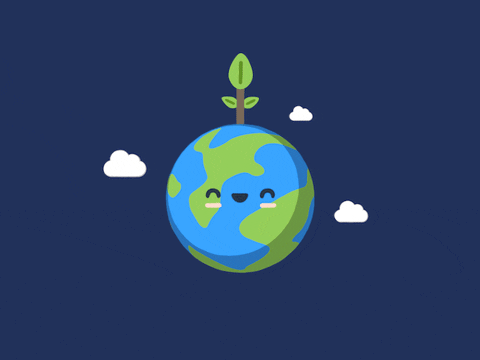Your simple, everyday habits may be more of a problem than they seem. We all know single-use plastics are toxic for the environment and contribute massively to greenhouse gas emissions, but what common items in your household are factoring in?
These 10 simple, cheap changes are better options for not only our planet, but for yourself as well.
Reusable water bottles
 Giphy
GiphyAs basic as Hydroflasks may be, at least they are helping to reduce plastic waste. It takes 1,000 years for every single water bottle to decompose--our landfills are overflowing with more than 2 million tons of them.
Reusable grocery and produce bags
100,000 marine animals are killed by plastic bags every year. Its production also contributes to 8% of our oil resource. They also cannot be recycled in curbside recycling bins. Not only do they break apart when you're carrying your groceries in them, but they are toxic for the environment, from production to when you throw them away.
Say no to makeup wipes
Your beloved, landfill-filling makeup wipes are terrible for the environment. It is estimated that 20 million pounds of single-use wipes are deposed in landfills every day. Opt for reusable makeup cloths or cloth pads.
Reusable Straws
In America, approximately 38,000 or more straws are used by one person over a span of 60 years. Most recycling facilities also do not accept plastic straws because they fall between the cracks or get stuck in machinery. Say no to when a restaurant or coffee shop offers you one. You can pay $7.99 for a pack of 500 plastic straws and kill the environment, or you can buy a pack of four for $4--your choice.
Thrifting
Most clothing is made out of cheap, synthetic fibers such as polyester or nylon, which does not decompose easily. To make polyester, coal, petroleum, air, and water are used--two of which are fossil fuels. The energy that goes into production of clothing causes a great deal of greenhouse gas emissions; by shopping second-hand, you are helping reduce these toxic chemicals polluting our air.
Reusable K-Cups
The number of K-Cups thrown into landfills as of today could wrap around the planet more than 10 times. By buying K-Cups, you are wasting money and paying to pollute the environment. It is way cheaper to buy coffee grounds (which are also very beneficial for compost) and you can fill reusable Keurig cup containers with them. You can even go to your local coffee shop and buy their coffee grounds; by bringing your own container, you can go zero-waste.
"I feel bad sometimes that I ever did it...It's like a cigarette for coffee, a single-serve delivery mechanism for an addictive substance...I don't have one, they're kind of expensive to use ... plus it's not like drip coffee is tough to make" -John Sylvan, K-Cup inventor.
You can buy reusable K-Cups on Amazon for cheap: https://www.amazon.com/s?k=reusable+k+cups&ref=nb_...
Reusable coffee cups
 Giphy
GiphySome plastic lids contain BPA; if you frequently drink hot drinks, it can contaminate your coffee and body. It is estimated that 2.5 billion single-use coffee cups are discarded every year. Coffee is a staple in American society--reduce your footprint by purchasing a reusable coffee cup. You can purchase Dunkin or Starbucks cups and even get a discount by using it--why say no?
Taking public transportation and biking
According to the EPA, motor vehicles collectively cause 75 percent of carbon monoxide pollution in the U.S, being one of the major causes of global warming. Public transit produces less pollution per mile than a car carrying one passenger. We all know the 80 bus at UW can be a pain in the ass, but driving to class is way worse in terms of environmental impact. Biking is also a great way to get across campus fast and without polluting.
Reusable sandwich bags
Breaking it down, the average person uses and throws away 540 single-use sandwich bags every year, and they will stick around for way longer than we ever will. With one swap, you can keep those hundreds of bags out of the ocean by purchasing reusable sandwich bags or food containers to bring for lunch.
Bamboo toothbrushes
 Giphy
GiphyPlastic toothbrushes take over 400 years to decompose, releasing chemicals into the air when thrown into a landfill. A billion will be thrown out this year, most being plastic. Bamboo toothbrushes are naturally antimicrobial and biodegradable. You can purchase a 10 pack for $9 on Amazon.
These 10 effortless changes you can make in your life can have a massive impact on the environment. Next time you go to use single-use plastic, think of what you can change to benefit our Earth.
















